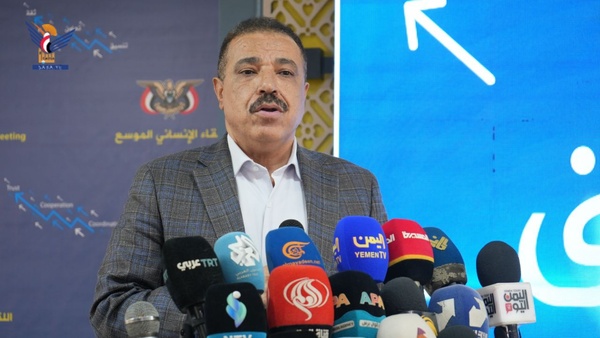
Sana'a - Saba:
Participants in the expanded humanitarian meeting, organized on Monday by the International Cooperation Sector of the Ministry of Foreign Affairs and Expatriates in Sana'a, emphasized the need to adhere to humanitarian principles and disregard political considerations and pressures in humanitarian work.
At the conclusion of the first day of the meeting, they stressed the importance of coordinating with the Ministry of Foreign Affairs and Expatriates—through its International Cooperation Sector—as the sole channel for direct engagement between organizations and government entities. This includes submitting programs, projects, activities, and all emergency interventions.
The participants highlighted the need to enhance coordination between the government, the United Nations, and specialized agencies, fostering trust and teamwork across all stages of humanitarian work—"joint planning, facilitating implementation, exchanging reports, and conducting impact assessments." They also agreed to develop a joint coordination mechanism through the International Cooperation Sector, involving government agencies, UN bodies, and enforceable national decisions.
Additionally, the meeting emphasized collaborative efforts between the government, UN offices, and agencies to overcome challenges facing agreed-upon humanitarian programs, projects, and activities that had been previously coordinated for implementation.
The participants called on the UN, represented by its offices, agencies, and organizations in Yemen, to intensify efforts in highlighting the scale of the humanitarian crisis faced by the Yemeni people in international forums and meetings. They urged the UN to reflect the true approximate number of people in need across all its published reports.
They also underscored the importance of transparency in partnerships by exchanging periodic and annual reports in accordance with this principle. Furthermore, they called for the resumption of funding for sustainable and developmental programs, urging increased advocacy with donor countries to secure necessary funds and bridge the financial gap to meet priority humanitarian and basic needs.
The meeting also demanded a reconsideration of the decision to halt humanitarian aid in Sa'ada Governorate and developmental projects in northern provinces, stressing the need to operate based on humanitarian principles free from political pressures. Finally, they called for the development of a joint strategy between the government and the UN to address the displacement crisis.
Participants in the expanded humanitarian meeting, organized on Monday by the International Cooperation Sector of the Ministry of Foreign Affairs and Expatriates in Sana'a, emphasized the need to adhere to humanitarian principles and disregard political considerations and pressures in humanitarian work.
At the conclusion of the first day of the meeting, they stressed the importance of coordinating with the Ministry of Foreign Affairs and Expatriates—through its International Cooperation Sector—as the sole channel for direct engagement between organizations and government entities. This includes submitting programs, projects, activities, and all emergency interventions.
The participants highlighted the need to enhance coordination between the government, the United Nations, and specialized agencies, fostering trust and teamwork across all stages of humanitarian work—"joint planning, facilitating implementation, exchanging reports, and conducting impact assessments." They also agreed to develop a joint coordination mechanism through the International Cooperation Sector, involving government agencies, UN bodies, and enforceable national decisions.
Additionally, the meeting emphasized collaborative efforts between the government, UN offices, and agencies to overcome challenges facing agreed-upon humanitarian programs, projects, and activities that had been previously coordinated for implementation.
The participants called on the UN, represented by its offices, agencies, and organizations in Yemen, to intensify efforts in highlighting the scale of the humanitarian crisis faced by the Yemeni people in international forums and meetings. They urged the UN to reflect the true approximate number of people in need across all its published reports.
They also underscored the importance of transparency in partnerships by exchanging periodic and annual reports in accordance with this principle. Furthermore, they called for the resumption of funding for sustainable and developmental programs, urging increased advocacy with donor countries to secure necessary funds and bridge the financial gap to meet priority humanitarian and basic needs.
The meeting also demanded a reconsideration of the decision to halt humanitarian aid in Sa'ada Governorate and developmental projects in northern provinces, stressing the need to operate based on humanitarian principles free from political pressures. Finally, they called for the development of a joint strategy between the government and the UN to address the displacement crisis.